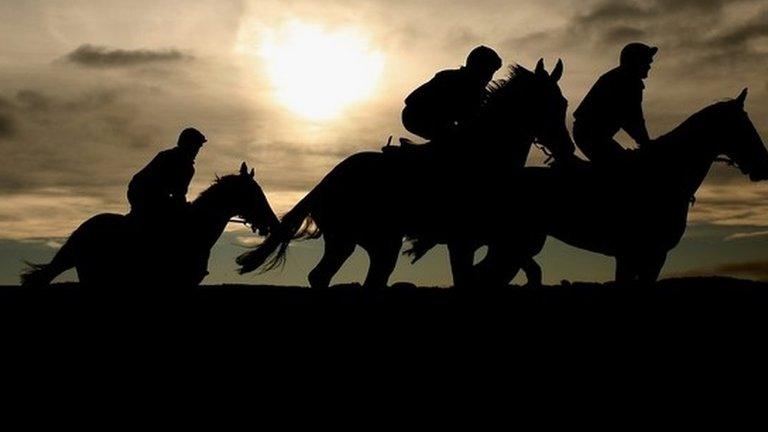‘Racing not out of woods’ over equine flu, says animal health expert
- Published
Equine flu: Inside the Newmarket laboratory that detected the outbreak
British racing is "not out of the woods yet" in the equine flu crisis, a leading expert has warned.
Dr Richard Newton, of the Animal Health Trust (AHT), has spoken amid rising instances of a virulent strain among the general horse population.
The BBC has learned that eight times as many flu cases have been reported among UK horses in the first six weeks of 2019 as in the whole of last year.
Racing resumed on Wednesday after a six-day shutdown.
"What we worry about is that the racing network is highly connected," said Newton, the AHT head of epidemiology and disease surveillance, who is a world-renowned expert on equine diseases.
The AHT is a charity which has worked around the clock to analyse all the samples at its laboratories in Newmarket.
A total of 16 locations in England and Scotland suffered an outbreak of equine flu between 1 January and 12 February.
It has been spreading across northern Europe - with the Republic of Ireland, France, Belgium and the Netherlands all affected.
Newton said the virus was "the quickest-spreading" he has seen.
Flu has only been found in two racing yards despite more than 3,000 samples being analysed, Newton told BBC Sport.
Newton said there was concern that the highly contagious disease might hit the breeding season, which started on Thursday.
At the height of fears over the virus spreading, 174 racing stables - more than a quarter of the total in Britain - were placed in lockdown.
'We have a much better handle on the problem'
Flu is endemic among horses in the UK, but the shutdown was "necessary" because of escalating fears over the Florida Clade 1 strain of the virus, which originated in North America, and the potential impact on the Cheltenham Festival, which runs from 12-15 March.
Newton said: "We know we are not out of the woods yet but we have a much better handle on the extent of the problem. Horse flu doesn't tend to kill horses, but it kills horse events."
The crisis was sparked after three horses tested positive at the Cheshire stables of Grand National-winning trainer Donald McCain. Three further positives followed, but the shutdown and tighter biosecurity measures may mean there is long-term gain for racing from the short-term pain.
"A great deal of the emphasis now is on trainers to help themselves and be prepared to do their own shutdowns," Newton said.
"We are talking about athletes here building up to the prime of their career - flu getting into a yard will set those animals back."
There were three positive tests among British non-thoroughbreds on Tuesday alone, compared with two in the whole of 2018.
'If you don't act quickly, it can get away from you'
Some trainers have criticised the shutdown - Nigel Twiston-Davies called it a "massive overreaction" - as well as new rules that require all horses competing in races to have been vaccinated within the past six months, rather than a year.
"We did feel it was probably only a matter of time before it was detected in vaccinated horses and thoroughbreds," said Newton.
"It might have been that Donald McCain was not the only trainer inadvertently sending flu-infected horses to races.
"We have been trying to make the right decisions to minimise any long-term impact.
"What we know from our experiences around the world is that if you don't act quickly, it can get away from you.
"Stopping all racing in the UK is not a decision you take lightly, but this is a highly infectious virus and it was breaking through the vaccine."
- Published15 February 2019
